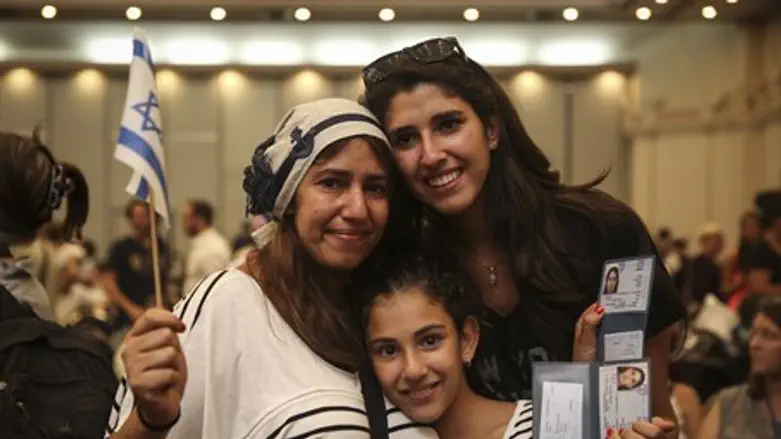
Following the horrific attacks in Paris last week that included a hostage crisis at a kosher supermarket, where four Jews were murdered by an Islamist terrorist, a large wave of French Jewish immigrants are expected in Israel in the near future - but how is Israel to deal with the assimilation rampant in France?
Naftali Kandler, director of the Ami Conversion Ulpan (Hebrew school), spoke to Arutz Sheva about the need to prepare not only to provide housing and employment opportunities for the Jewish community coming from France, but also to deal with assimilation which research has found is skyrocketing to as high as 80% in Europe.
"The figures (in France) are between 40 and 70 percent assimilation, depending on the community," revealed Kandler. "The official figures are 40%, but in distant communities the situation is much harder."
According to him there is no reason to rely on the assumption that Jews choosing to make aliyah (immigrate) to Israel are closer to the Jewish tradition than others, and therefore will not have intermarried.
"The family tree of the people of Israel is important, and therefore we don't rely on anything," he emphasized.
In 2015, around 10,000 Jews are likely to immigrate to Israel from France according to Kandler; France led the world as the largest source of olim (immigrants) in 2014, with 4,566 Jews moving to Israel from the country, and after the recent attacks those figures are set to rise even higher.
If 10,000 French Jews immigrate, Kandler estimates that based on statistics 15% of them will be those who have assimilated and intermarried, stating "around 1,500 with rights to make aliyah, Jews from their father's side, of the line of Israel, will immigrate and be part of the French community that makes aliyah."
Despite not being Jews according to Jewish law this immigration should be welcomed, says Kandler, stating "this is first of all the 'sprouting of our redemption' and all that. The people of Israel are returning to their land together with those who assimilated and came along, those who we almost said kaddish (the prayer for the dead also said for those who marry out of the Jewish people - ed.) on."
"Don't repeat the Russian mistake"
Kandler called on state authorities not to repeat the same mistake made with the large aliyah from Russia and the former Soviet Union in the 1990s, when the Chief Rabbinate hesitated and did not open massive numbers of conversion ulpanim to clarify the Jewish status of the immigrants.
"They needed to receive them spiritually," he said, noting his organization is working to accomplish this task by running conversion classes in French. The group also holds pre-aliyah tours for French Jewish youth to visit Israel and reconnect with the Jewish tradition.
When asked about the possibility that immigrants may feel insulted by having a status as "converts" in clarifying their status according to Jewish law after having been persecuted as Jews abroad, Kandler said in the case of French immigrants "the phenomenon is completely different."
"The feeling is shame. This is a traditional Sephardic community, and therefore the connection to the tradition and Judaism there is greater (than among the Russian community in general - ed.), and despite that they reached percentages of assimilation," he explained.
Kandler continued "their feeling is not that we're Jews and we deserve it, but rather a need to hide and not admit that there's a halakhic (Jewish legal) problem. ...There is only one way to enter the Jewish people and that's through a conversion of 100%. We will remove the fears and the roadblocks from those arriving in Israel who will see this is a process that they want."
Discussing the legal opinions that frown on easing conversion over fears that it may lead to a watered down process that does not derive from true spiritual connection and commitment, Kandler emphasizes that his organization's activities are based on the opinions of top Jewish legal scholars and follows the spirit of the rulings of Rabbi Ovadia Yosef zt''l, are overseen by Rabbi Shlomo Amar and headed by Rabbi Chaim Drukman and others.
What do we do?
"There are also opinions on the other side, but as a man of action I look for a solution - the olim are arriving. What do we do? Several thousand will come with a connection to the people of Israel, who are our brothers and come to Israel because they have a connection to the people. What do we do?" he posed.
Kandler stated "if they tell me to build a reality in which there are Israeli Jews and those who aren't Israeli and aren't Jews in the state, that's complete nonsense. That's a ticking time bomb of assimilation that we are living within. Our halakha is brave enough to deal with these realities."
"Whoever doesn't understand that our state is the first sprouting of our redemption, and that means...that the nation is returning to its land after two thousand years and needs to deal with this reality of conversion, doesn't understand halakha and Judaism, and doesn't have the halakhic courage, and stays in the mindset of the exile," he emphasized.
Kandler concluded "our halakhic viewpoint is larger. The Chief Rabbis of Israeli all led this. This isn't a neighborhood rabbi or a community rabbi, but rather the most senior halakhic authority, the Chief Rabbinate that leads the process and we follow in its light, and we need to remove all the politics."
Regarding assimilation, the topic has received attention in Israel in recent weeks during a police crackdown on Lehava, an organization combating assimilation within Israel. Despite the fact that a court threw out police arrests and ruled that the group's activities against assimilation are perfectly legal, Defense Minister Moshe Ya'alon (Likud) is trying to have Lehava outlawed.